Health is wealth (Small Changes, lifelong impact)
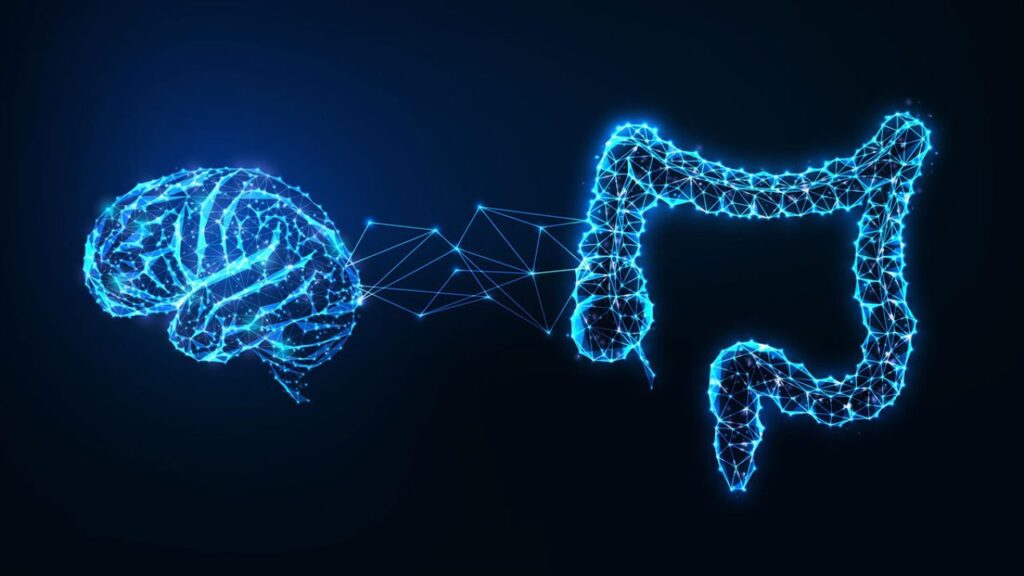
What foods to eat and which to avoid. Fruits or juices Outside food or homemade, protein or pure clarified butter (ghee). I found so many questions on the internet yesterday. Which foods are good for the body after the age of thirty? There were so many questions I observed.
The Connection Between Digestion and Mental Health: Exploring the Gut-Brain Axis
The human body is a highly sophisticated and secretive system in this world. Medical professionals and researchers continue to find previously unexplored parts of the human body.
However, in recent days, I discovered one huge issue that has the potential to become a serious concern in the future, particularly for the younger generation. Yes, I’m talking about the digestive system. Especially in India.
The gut is essential for digestion and breaking down the food we eat. This is why it is critical to have a healthy stomach. A healthy gut simply has more beneficial bacteria than harmful bacteria.
However, a recent poll discovered that 7 out of every 10 persons in metropolitan India had digestive or gut health difficulties. According to the report, 59% of people complain about it once a week, while 12% suffer every day.
The majority of consumers (80%) thought that digestive/gut health disorders could contribute to long-term lifestyle diseases.
In terms of the gut-brain connection, 59% of people who have digestive/gut health issues every week also have certain mental health challenges such as anxiety, poor memory, mood swings, and a lack of energy, which is significantly higher than those who have less frequent bouts of digestive issues.
Approximately 67% of persons have improved or altered their lifestyle by increasing physical activity or changing their dietary choices. Furthermore, nearly four out of ten respondents believe that switching to chemical-free, fresh dairy products can help prevent digestive or gut health problems.
Sixty percent of participants believed that their food played an essential role in preventing lifestyle diseases or digestive problems, thus they altered their diet in recent years.
Overall, six out of ten people seek chemical-free food options for their everyday diet.
Gut health has become a major issue in recent years, owing to an increase in digestive illnesses worldwide.
In India, as in many other nations, there has been a significant increase in inflammatory bowel disease (IBD), irritable bowel syndrome (IBS), and other gastrointestinal disorders.
A variety of factors contribute to poor gut health, including food choices, stress, environmental pollutants, and lifestyle modifications.
The adoption of Western dietary habits, which include a high intake of processed foods, refined sugars, and unhealthy fats, has been associated to an increase in gut-related issues.
Chronic stress and antibiotic use can change gut flora, leading to IBS and IBD (BioMed Central, Body Bio).
The prevalence of digestive illnesses in India and other countries of Asia is expected to increase dramatically.
By 2035, India is anticipated to have a fourfold increase in IBD cases (Body Bio). This surge can be ascribed to fast modernization, dietary changes, and greater antibiotic use.
Understanding the importance of gut health and taking proactive measures, such as eating a balanced, fiber-rich diet, minimizing stress, and limiting exposure to environmental pollutants, can help alleviate these symptoms.
Regular probiotic ingestion, as well as leading a healthy lifestyle, can help support gut health and prevent digestive diseases.
The Connection Between Digestion and Mental Health: Exploring the Gut-Brain Axis
Some major signs of unhealthy gut
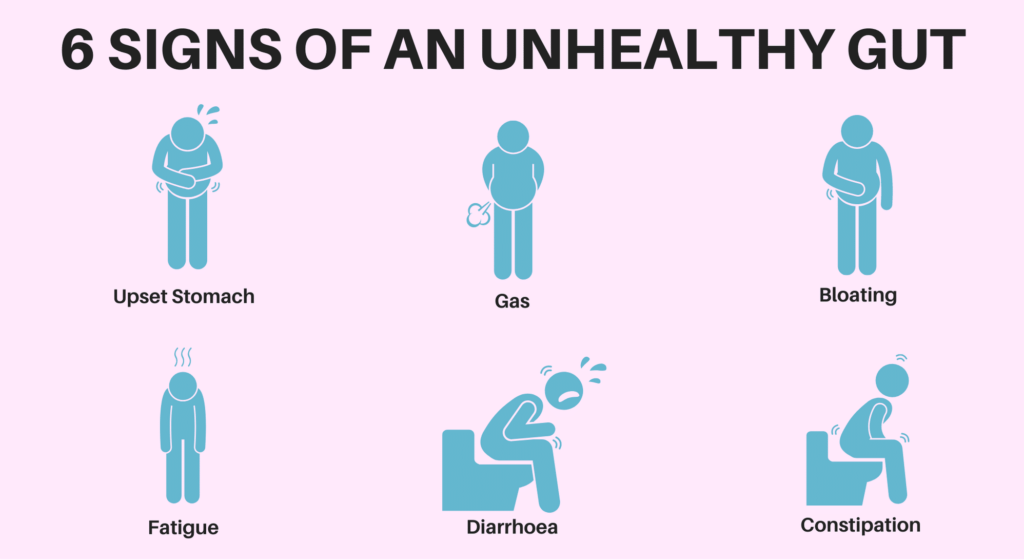
Your gut microbiome may be altered by:
Risk factors include stress, insufficient sleep, lack of physical activity, and excessive consumption of ultra-processed foods.
Examples of risk factors include smoking, alcohol consumption, and antibiotic use.
The gut microbiome is also influenced by factors beyond our control, such as our surroundings, age, birth mode, and whether we were breastfed or bottle-fed as infants.
While we cannot use a single measure to assess our gut health, several indicators of poor gut health include:
Digestive issues – such as gas, bloating, constipation, diarrhea, and heartburn.
Sleep disorders or fatigue
Symptoms may include increased stress, low mood, or anxiety, as well as frequent infections like the common cold.
An sick gut can cause a variety of issues that affect not only the digestive system, but the entire body.
Some other health issues causing poor gut health:
Gastroesophageal Reflux Disease (GERD) is persistent acid reflux that can cause esophageal injury.
Nutrient deficits
Poor nutrient absorption caused by intestinal injury or inflammation can result in iron, calcium, and vitamin B12 shortages.
Mental health issues
Anxiety and depression: are linked by the gut-brain axis. Gut flora imbalances may lead to mental health disorders (BioMed Central).
Brain Fog: Poor gut health can cause cognitive deficits, such as difficulties concentrating and memory issues.
Immune system problems
Gut bacteria imbalance can weaken the immune system and increase susceptibility to infections and illnesses (BodyBio).
The Connection Between Digestion and Mental Health: Exploring the Gut-Brain Axis
Chronic Inflammation
Chronic inflammation caused by poor gut health might worsen autoimmune diseases like rheumatoid arthritis and lupus.
Chronic gut inflammation can cause systemic inflammation, which affects multiple organs and tissues throughout the body.
Skin Conditions
Acne, Eczema, Rosacea: Inflammatory skin problems are frequently associated with gut health issues.
Psoriasis, an autoimmune skin condition, can also be influenced by intestinal health.
Metabolic issues
Obesity And Metabolic Syndrome: Poor gut health can impact metabolism, resulting in weight gain and related metabolic problems (BodyBio).
Type II Diabetes: An sick stomach can lead to insulin resistance, which is a precursor to diabetes.
Hormonal imbalances
The gut regulates hormones, and imbalances in gut bacteria can alter hormonal balance, resulting in thyroid difficulties and polycystic ovarian syndrome.
Food Intolerances and allergies
An unhealthy gut can contribute to the development of food intolerances, in which particular meals cause digestive problems.
New Allergies: Disruptions in the gut microbiome can cause the emergence of new food allergies.
Chronic fatigue
Persistent exhaustion and lack of energy might be caused by poor gut health, which impairs nutrition absorption and energy production.
Does gut health matters?
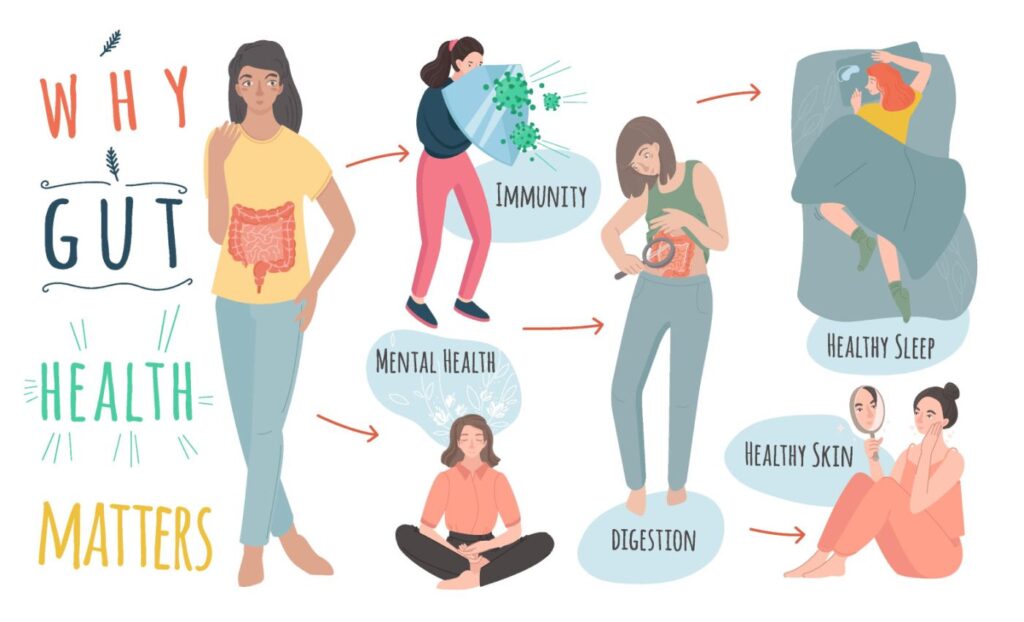
Yes, absolutely. In ancient times, our digestive system was regarded a god. That is why it is usually stated that digestion must be healthy and efficient. If digestion is good, the entire body will feel active. Gut health should not be taken casually.
The stomach digests foods and absorbs nutrients to support your body’s functioning.
The gut’s importance to our general health is a growing area of medical research. According to research, our gut flora might affect every organ in our bodies.
A healthy gut allows for appropriate digestion and absorption of nutrients from food. It helps to avoid digestive problems such as bloating, constipation, diarrhea, and irritable bowel syndrome (IBS).
Efficient digestion is necessary for good health and energy levels.
The gut contains around 70% of the body’s immune cells. A healthy gut microbiota promotes a robust immune system, which helps to guard against infections and illnesses.
The Connection Between Digestion and Mental Health: Exploring the Gut-Brain Axis
Imbalanced gut bacteria might decrease immunity and increase susceptibility to infections (Body Bio).
The gut-brain axis, a communication network that connects the gut and the brain, emphasizes the importance of gut health for mental wellbeing.
Gut bacteria generate neurotransmitters such as serotonin, which affects mood and mental health. A healthy gut improves overall well-being, such as better sleep, more energy, and more mental clarity.
The gut microbiome influences many facets of health, making it critical to maintaining a high quality of life. Gut health is critical for digestive function, immunological response, mental health, metabolic management, inflammatory control, skin health, and overall well-being.
Maintaining a balanced gut microbiome through a nutritious diet, regular exercise, proper sleep, and stress management is critical for overall health.
How to improve gut health?

There are several natural approaches to boosting gut health. There is one simple technique to reach your goal. Along with the diet, there are some restrictions on some foods.
There is a list of food products that can be organically improved:
- Yogurt
- Fruits: papaya, apple, cucumber, banana, watermelon, melon, mango, pear, oranges, grapefruit, lemons, limes, shaddocks, citron, and all sorts of citrus fruit.
- Beet root (beneficial for boosting blood)
- Dahi (curd).
- Homemade veggie curd.
- Boiled beans (you may also add tomato and onion)
- Porridge
- Green veggies.
- Homemade chapaties (no maida).
- Rice (but boiled rice, removing all the starch from the rice)
- Drink one glass of milk daily.
- Enjoy peanut butter on brown toast for a protein boost.
- Pure clarified butter.
- Buttermilk (Chaas): A fermented curd-based drink that is beneficial to digestive health.
- Pickles (Achar): Naturally fermented pickles (not vinegar-based) are high in probiotics.
- Whole grains include bajra (pearl millet), jowar (sorghum), and ragi.
- Legumes & Pulses: Dal, chana, and mung beans.
- Vegetables: Bhindi (okra), gajar (carrots), and palak (spinach).
Nuts and seeds include almonds (badam), flaxseeds (alsi), and sesame seeds (til). - Berries include Indian gooseberries (amla), which are abundant in vitamin C and polyphenols.
- Green tea is becoming increasingly popular in India due to its high polyphenol content.
- Turmeric (Haldi) contains curcumin, which has anti-inflammatory properties.
- Kanji is a traditional North Indian fermented drink produced from black carrots.
- Handvo is a fermented Gujarati meal composed with lentils and rice.
- Gundruk is a fermented leafy green vegetable common in the northeastern regions.
- Ginger (Adrak) is known for its anti-inflammatory effects.
- Coconut Oil: Promotes Gut
The Connection Between Digestion and Mental Health: Exploring the Gut-Brain Axis
The things listed above are ideal for promoting intestinal health. Including them in your everyday routine can help you maintain good gut health. Not just the stomach, but these substances can also cure a variety of disorders without any further effort.
The best aspect is that it is inexpensive and completely affordable. It’s easy to embrace wherever you go. I’m not saying you should completely abandon your present diet; instead, start incorporating these products into your meals and observe how it affects you in only one week.
You’ll feel like you’re flying in the skies and have a lightness in your tummy. If the gut is happy, the entire body is pleased, particularly the brain. The most significant relationship exists between brain and gastrointestinal health.
Because a sick stomach interferes with food breakdown, it is unable to supply sufficient nutrition during digestion. This causes our brain to feel less energized and active. It is also one of the key reasons why most individuals feel inactive during the day.
High-fibre diet
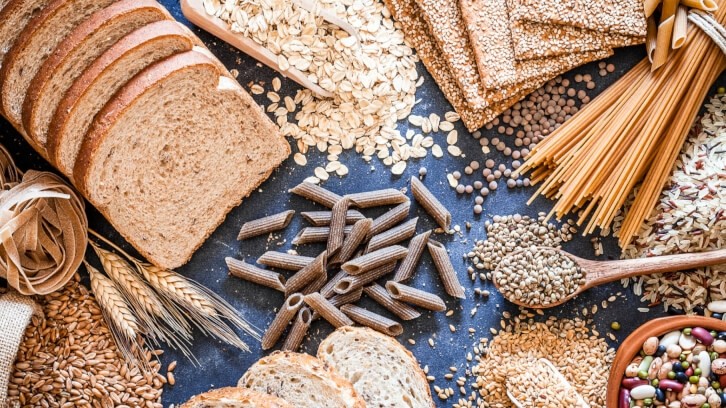
Fiber, which is found mostly in fruits, vegetables, whole grains, and legumes, is well known for its ability to prevent or treat constipation. However, fiber-rich meals can also help you maintain a healthy weight and reduce your risk of diabetes, heart disease, and certain types of cancer.
Fiber is typically classed as either soluble (dissolves in water) or insoluble.
Soluble fiber: This type of fiber dissolves in water and forms a gel-like substance. It can help reduce blood cholesterol and glucose levels. Oatmeal, peas, beans, apples, citrus fruits, carrots, barley, and psyllium all contain soluble fiber.
Insoluble fiber: This form of fiber accelerates the flow of material through your digestive system and increases stool bulk, making it beneficial to those who suffer from constipation or irregular stools.
Insoluble fiber-rich foods include whole wheat flour, wheat bran, nuts, legumes, and vegetables including cauliflower, green beans, and potatoes.
The amount of soluble and insoluble fiber differs amongst plant diets. Consume a diverse range of high-fiber foods for the best health benefits.
Benefits of high fibre diet:
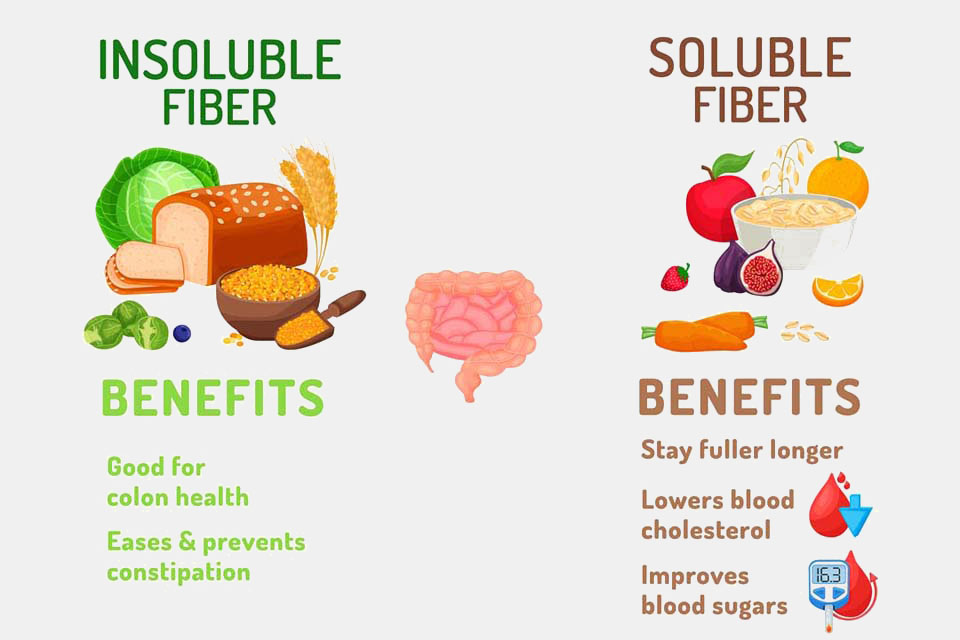
- Normalizes bowel motions.
- Helps preserve gut health.
- Lowers cholesterol levels.
- Helps regulate blood sugar levels.
- aids in achieving a healthy weight.
- helps you live longer.
the Daily Value for fiber is 28 grams per day for adults on a 2,000-calorie diet. This number may also depend on age or sex.
- Women under 50: 25 to 28 grams per day
- Men under 50: 31 to 34 grams per day
- Women 51 and older: 22 grams per day
- Men 51 and older: 28 grams per day
Children aged one to eighteen should consume 14 to 31 grams of fiber per day, depending on their age and gender.
The Connection Between Digestion and Mental Health: Exploring the Gut-Brain Axis
Exercises of gut health

Exercise is essential for boosting gut health because it increases the diversity and number of good gut bacteria, improves digestive function, and reduces inflammation.
The following workouts can assist enhance gut health:
- Walking
- Running and jogging
- Cycling
- Swimming
- Weight lifting
- Yoga
- Stretching
- Bodyweight exercises
- HIIT workouts
Pingback: Curcumin explained: The science behind turmeric's healing power
Pingback: Maximizing Longevity: A Deep Dive into Food Chains and Their Health Benefits
Pingback: 43. Easy Ways to Keep Your Gut Flora Healthy Every Day - healthymefityou
Pingback: 55. Natural Beverages That Boost Your Health Every Day
Pingback: How Skipping Breakfast Affects Your Energy Levels